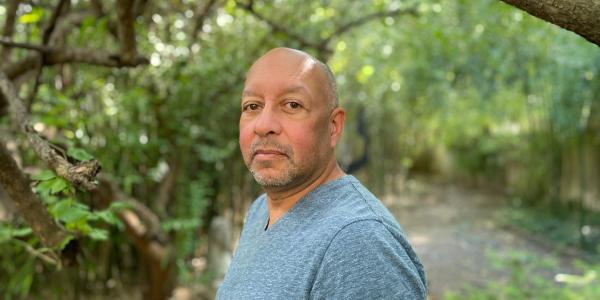Just a few months after he won the 2023 Pulitzer Prize in Poetry, Carl Phillips, professor of English, sat down with his former student, award-winning poet Paul Tran, MFA ’19, to talk about his early career in classics, the art of teaching, and the life-changing power of poetry.

Paul Tran: One of the many reasons I found the MFA program in writing at WashU so enchanting was the possibility of studying with faculty who not only came from similar circumstances, but who also transformed what they were given into the lives they have now.
Carl, can you tell us how you grew up, how you became a high school Latin teacher, and the ways those experiences shaped your early thinking as a poet?
Carl Phillips: In college, I was initially studying to be a veterinarian. But I had promised my high school Latin teacher that I would take one Greek class, and that was the only course my freshman year that I enjoyed. So, when I broke into tears one evening over an organic chemistry problem set, I suddenly thought, why not do what you enjoy and worry about what you can do with it later.
My senior year, a professor suggested a new master’s program his friend had started for people who wanted to teach high school Latin. It helped you get certified in a bunch of states to teach in public schools. That seemed like a practical thing to do, even though I was afraid to speak in front of groups. But the first day I started teaching, I found that I loved it. I thought, this is what I am going to do for the rest of my life. Being there for kids those years I was a high school teacher was very rewarding.
While I was doing that, I started writing poems just for fun. One day, the poet Martín Espada visited my school, and, at the end of the day, he offered a one-hour workshop for teachers. That was the first time I’d ever shown my poetry to anybody. He suggested I apply for a state grant, and within six months I had won $10,000. It all just tumbled into place. Suddenly, I had a book of poems. Suddenly, my teacher, Robert Pinsky, said he had just come back from a school called Washington University, where he’d been a visiting Hurst Professor. He said, “You know, they’re looking for a one-book poet. Maybe you’d have a chance.” It was supposed to be a three-year teaching job, and it’s now been 30. So, I guess it worked out.
I’m still terrified when I go into the classroom, which I think is healthy because it means I haven’t become complacent. And even though I only teach graduate students now, I still feel as if teaching is a way to give them a model for one way to be an adult in the world.

Tran: You’ve taught us that a poem consists of patterned language. To analyze a poem is to analyze the patterns of a human mind, how the mind orders and arranges their world, feelings, thoughts, and beliefs. Can you share how you came to this belief and how you tried to teach us this in the classroom?
Phillips: I’m not a trained academic and I didn’t study to be a professor, so I don’t know how to teach poetry in some highly intellectualized way. I don’t think I would like poetry if I thought it was this big, intellectual thing I had to unravel.
Poetry is many things to me, and one of them is mystery. And that’s not a thing that goes over well in academic discussions. How do you talk to a class about that? But there is something mysterious about poetry, and there’s also something very bodily and blood and guts about it.
One of the first things I make sure students know is that this is a class where you’re going to treat poems as physical things. I don’t want them to bring in secondary sources. Just read the poems. What did the poet say? That’s just one way of teaching and looking at literature, but it’s the only way I know.
It’s like the cooking show I hosted on my Instagram during the COVID-19 lockdown. People kept saying, “Oh, you’re actually a regular person in your own kitchen whipping batter.” And I thought, why are they so surprised? But some of these cooking shows make you feel so intimidated. And here’s someone, just a regular home cook, making something from scratch and saying you can do it too. And that’s how I feel about teaching; it’s an invitation. Sometimes I think people see teaching as imposing knowledge upon people. But I want to invite people in and say, “Let’s look at this. Let’s play around with it.” I think when people feel invited, they start to trust you. And that seems so important in a classroom.
Tran: I remember the seminar on patterns and forms very well. It took me a long time to learn exactly what you wanted me to learn, which was to focus on the poem in front of me. It really changed my thinking and approach to living in many ways. Focusing on the poem in front of me means that, as I walk through life, I can only focus on what’s in front of me and take it one step at a time.
You’ve said that all art, including poetry, is a “record of interior attention paid.” And I wanted to spend some time talking about the importance of exploring our interiority — not just representing it, but also investigating it — as people of color, as queer people. Why is that important to you?
Phillips: When I was growing up, every example around me suggested that what I am was a terrible thing. Back in the ’60s and ’70s, there was no representation of people of color. When I learned to read, all the books were filled with white kids, a dog, white parents — suddenly you’re being told that you don’t or shouldn’t exist. As I got older, whenever queerness was mentioned, it was a joke or something that should be erased entirely. But paying attention to one’s own interiority, and writing from that interiority, can be a rescuing device, a way to make a private space for who one is, despite how others might think we should be.
Sometimes things don’t feel real to me until I’ve given them an architecture. I’ll feel as if I have these abstract feelings floating around in my head, but once I’ve patterned them into a poem, I’ll feel as if I’ve locked those feelings into place and given them at least temporary meaning. And so, in that sense, I’ve found some mental stability for myself for a moment. It doesn’t last forever, which I guess is what pushes me toward the next poem.

That might not be why everyone writes, but I’ve never really thought much about audience. I’ve always felt like I’m trying to make a puzzle work for me, if only briefly. And then it’s just seemed incidental when other people read it and say, “Oh, your poem helped me.”
Tran: You said that one poem propels the other. But as soon as we find that architecture, that shape for the shapelessness, it moves and becomes something else, or our circumstances change. And there’s an endless list of everyday things to do: grocery shopping, making dinner, laundry, paying bills. But, in light of all this, I do want to celebrate you. In the process of writing one poem after another, you arrived at this incredible collection, “Then the War: And Selected Poems, 2007-2020,” which won the Pulitzer Prize.
Phillips: Yay! So weird.
Tran: I know! What did it feel like to have that interior attention paid being recognized, to see that your work had resonance?
Phillips: Well, I’m grateful that I’ve made a body of work that other people feel they can keep looking at over their lifetimes and sharing with others. That makes me feel like I’ve been here for a reason. But as soon as I have that thought I think, Carl, you don’t need a prize to know that; you’ve been here all along. And even if you never won a prize, one of the many reasons you were here was to share what you know with other people in a classroom, and maybe help them in some way.
I want there to be fewer people who had to feel hurt and lost about who they are in the way that I did. If I can do that in the classroom or with my poems, it’s just one of the greatest things. People have talked a lot about how the Writing Program at WashU is an extremely safe space for queer writers, and I feel really proud of that.
Tran: Maybe the prize is less of a confirmation of the things you already knew and more of a thank you — from the community, from your readers — for the life-changing work.
We met at the Palm Beach Poetry Festival, which I applied to because I wanted a chance to learn from you even if I didn’t get into the Writing Program at WashU. I know so many people who share that same sentiment and wish they could be a fly on the wall of your classroom.
Thank you for teaching me and poets like me not only how to write, but how to think, how to rise above our circumstances to take back our agency and use the craft of writing to build the lives we deserve.
Phillips: The real reward is having conversations with someone like yourself. Obviously, you are your own person, and I haven’t created you. But it’s hard not to feel that pride that a parent presumably feels when seeing their child has not only made it to adulthood but is flourishing as well. And I feel like that’s the point: to help contribute to a future. The future being you with your brand-new university teaching job. It’s like a relay race where you pass the torch, and the next person runs with it. There’s something very gratifying about that.
Carl Phillips, Professor of English: Phillips is the author of 15 books, including the Pulitzer Prize-winning collection “Then the War: And Selected Poems, 2007-2020.” His other books include “Wild Is the Wind”; “The Tether,” winner of the Kingsley Tufts Poetry Award; and “Double Shadow,” winner of the Los Angeles Times Book Prize. He served as a chancellor of the Academy of American Poets from 2006 to 2012.
Paul Tran, MFA ’ 19: Tran is the author of the debut poetry collection “All the Flowers Kneeling.” Their work has appeared in The New York Times, The New Yorker, and Best American Poetry. They have won the Discovery/Boston Review Poetry Prize and received fellowships from the Poetry Foundation, Stanford University, and the National Endowment for the Arts. Tran is an assistant professor of English and Asian American studies at the University of Wisconsin-Madison.





